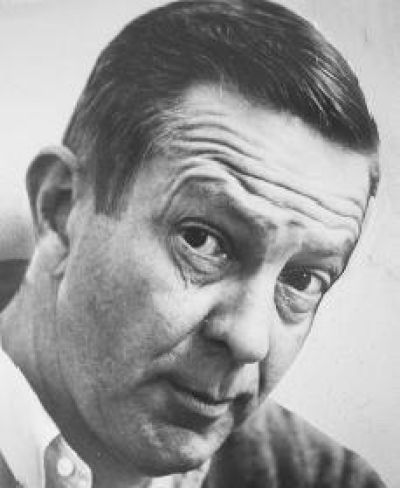I really liked the piano music in the background of this story. I did not like the narrator’s voice. He seemed bored by the story which didn’t help the suburban atmosphere, although maybe that was the effect he was going for. Reading about the story and the film based on it, though, I do like the concept. It’s a very 1960’s theme, tackling the feelings of isolation, wanderlust, and suspicion. One phrase towards the end of the story stood out to me, “Why, this party has everything..” as being the probable source of Bill Hader’s inspiration for one of Stefon’s catchphrases on Saturday Night Live. The change in music at the end (vaguely sounding like something by The Doors) also worked particularly well to highlight the story’s spooky conclusion. I don’t think this story really counts as science fiction or even speculative fiction, really, but I suppose it shares enough of an otherworldly quality with the genres that it gets lumped in.

The Swimmer
John Cheever
Mindwebs ran on KHA in the late 1970s to the early 1980s. It generally did not do full cast adaptations, preferring to let the narrative weight fall on Michael Hanson’s shoulders. In this example, Hanson is reading John Cheever’s increasingly surreal The Swimmer, first published in 1964 in the New Yorker. I enjoyed Mindwebs in general and this in particular when I encountered it. Will my young readers?
Mindwebs’ version of The Swimmercan be heard here.
This story was very, very weird. And not particularly in a way I enjoyed.
The first part of the story was very tedious, as I really didn’t care about this guy or his quest to swim every swimming pool between him and home. As the story went on, it was clear that something was happening with time, but I’m really not sure if that was intended to be metaphorical or an actual thing that was happening in the story.
I just didn’t like this. Even if I accept that it’s an actual speculative story with some kind of time travel going on, it still doesn’t appeal to me as a metaphor for I don’t know, growing old, not making good decisions, the emptiness of his life, or whatever. It felt like this was trying to show off how clever and deep it was, rather than tell a story.
The fact that this was an audio version probably increased my annoyance, since I couldn’t just rush through it to the end to see if there was a point.
—Mikayla
This story was extremely boring apart from the music.
I thought of the boring life of “the Kennedys” as it seems to me: full of tennis matches, cardigans, dinner parties and loneliness. I feel like I’ve heard this story all my life, and I just don’t care anymore.
I don’t really know why this story was so critically-acclaimed at the time. To me, it seems passé and overdone, like cheesy, psycho-thriller lite that boring politicians find interesting because it taps into their worst fears about losing all their possessions.
The story was so bland, and the main character didn’t intrigue me at all. Nor did all of the characters he visited. They all seemed the same: snobby, rich, white, WASPy suburbanites. I assume the story is supposed to be vague in a way that makes you wonder whether he has actually become a wandering vagrant, or whether this is all a story he tells himself psychologically to cope with loss.
I wanted more detail. I wanted intriguing snippets of conversation that would hint at more detail and at more characterization.
The one thing that was interesting was the music. If there existed soundtracks of musical journeys with better writing overtop, I would listen to those. I wish more of these old radio episodes had instrumental accompaniment.
Verdict: quite boring. I’m really glad I was exercising while listening to this, or else I might have fallen asleep.
